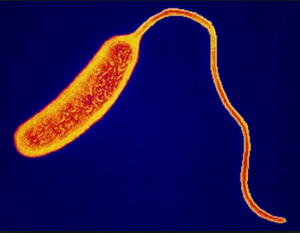
Four people have been confirmed dead in Nakuru following a cholera outbreak in Nakuru county. One person died at home in Pondamali while three others died while undergoing treatment at the Rift Valley Provincial Hospital.
This comes one week after three people died after consuming the carcass of a cow that had died mysteriously.
Chief Executive Officer (CEC) in charge of health Dr. Muigai Kabii told journalists on Monday that nine other suspected cases have been reported in Rhonda, Bondeni and Kiti areas.
He said that three other people were being held in an isolation ward at the general hospital. Because of this the government has banned food hawking in the county.
Dr. Muigai said that the county is well prepared to handle the cases saying that all health workers are vigilant.
“We are going to supply chlorine tabs to all households in the town through our health officers to make sure that water is free from contamination,” said Muigai.
Dr. Muigai further cautioned residents on the use of unknown sources of water and called on them to observe basic household hygiene.
“Everybody should wash their hands after visiting the toilet and before eating food. This is a very contagious infection that can only be dealt with through proper hygiene,” noted Muigai.
He also called on anyone with any symptoms to report to the nearest health facility for testing and treatment.
According to the World Health Organization (WHO) cholera is an acute diarrhoeal disease that can kill within hours if left untreated. WHO further estimates that there are 3–5 million cholera cases and 100 000–120 000 deaths due to cholera every year worldwide.
While up to 80 percent of cases can be successfully treated with oral re-hydration salts, effective control measures rely on prevention, preparedness and response. It notes that provision of safe water and sanitation is critical in reducing the impact of cholera and other waterborne diseases. Although oral cholera vaccines are additional means to control the disease, they should not replace conventional control measures, WHO advices.

